
7 minute read
Common threads
from May SouthPark 2020
by SouthParkMag
A CHARLOTTE NONPROFIT UNITES WOMEN ARTISANS A WORLD APART.
BY CATHY MARTIN
Sometimes to get things done, all you have to do is ask. The expression has held true for Christin Boone, founder of the local nonprofit Empower for Hope. That’s not to say Boone hasn’t worked tirelessly over the last decade helping grow her organization from supporting a small sewing operation in east Africa to employing local artisans crafting high-end garments. But recognizing opportunities to advocate for her cause has allowed her to expand her mission — and Boone isn’t finished yet.
Twelve years ago, the Charlotte native hosted two women from East Africa in her home. They were in town for an event supporting women artisans at a local church. The women ran sewing projects in their home countries of Rwanda and Burundi, helping widows and other women get back on their feet in a region ravaged by genocide in the early 1990s, when an estimated 800,000 people were murdered as competing tribes battled for control.
The women shared horrific tales of violence, having witnessed family members being killed and narrowly escaping their own deaths. Goreth Inarukundo told a story of forbidden love — she met a man from the opposite tribe and they were forced to escape Burundi, a landlocked country about the size of Maryland, fleeing to Kenya.
Later, Inarukundo and her husband, Evariste, returned to Burundi and established Amahoro, a sewing project to help local women who had survived the atrocities.
“They knew that their calling was to help women who had survived the genocide, who were widowed, and teach them how to sew — teach them a trade and counsel them,” Boone says.
After the women left Charlotte, they stayed in touch with Boone. Having a background in marketing, Boone offered to help Inarukundo build a website for Amahoro to sell the handbags, zipper pouches, stuffed animals and other items made by the artisans in Burundi.
In 2010, Boone made her first trip to Africa, helping lead a women’s conference on topics including health and hygiene. After that trip, she was certain she’d be back.
“I just knew there was going to be a long-term relationship with them, somehow.”
Boone began making regular trips to Africa, bringing items made by the artisans of Amahoro back home to sell.
“I usually take a couple of women [with me] who might have sewing skills that could teach technique or could help us design new products,” says Boone, who learned to sew from her mother.
“I was always designing Barbie clothes and designing my prom dresses and designing my wedding dress,” she says, recalling frequent trips to Mary Jo’s Cloth Store, the beloved fabric shop that operated for 68 years in Dallas and Gastonia before closing last year.
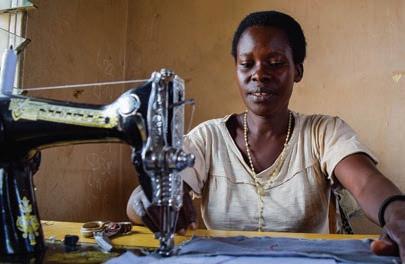
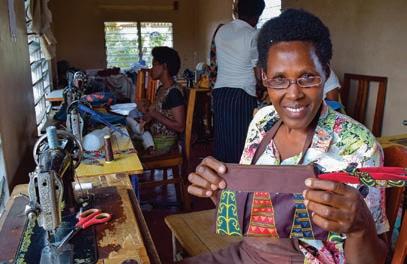
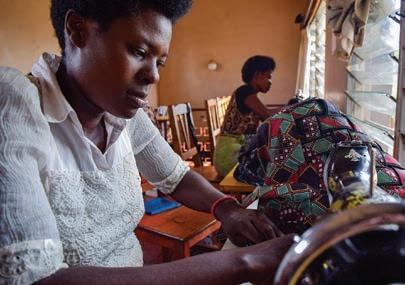
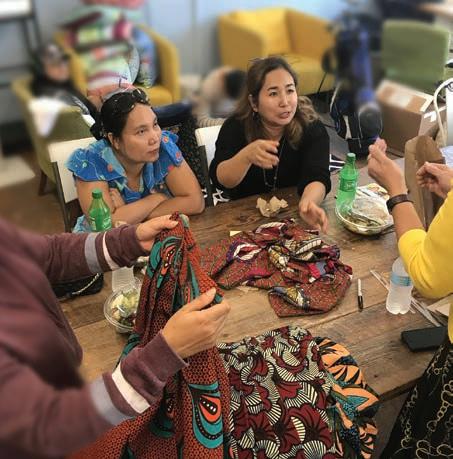
“I just love fabrics and color,” says Boone, who has two children, 17 and 19. “So it was just a really natural fit for me to be involved in the design process, and the marketing process of that.”
Before Boone stepped in to help, the tiny shop in Burundi might go an entire week without selling anything; its customers are mostly expats and aid workers passing through. Amahoro currently employs about 25 women making about 10,000 products a year. Its largest customer is a Christian attraction in Kentucky that purchases items to sell in its gift shop.
After a while, Boone realized she needed to supplement the work of the artisans in Burundi to fill orders. “There were times when I needed products made — zipper pouches or wallets or whatever — that I didn’t have enough of from Africa. I wasn’t going to get in enough.”
She learned about Project 658, a Christian ministry based in east Charlotte that operates a sewing school for refugees and immigrants. Supplying fabrics sourced from her trips to Africa, she began working with Project 658 to help fill orders.
“People kept saying, ‘I love those fabrics, can you make skirts?’” Around the same time, in 2018, The Mint Museum hosted an exhibition of African-print fashion. When she heard about the exhibition, Boone approached the museum staff.
“I said, ‘We’re dabbling in making some skirts. Would you want some skirts to hang in your gift shop?’” They said yes.
Before long, people started ordering the full, ballgown skirts to wear to The Mint’s annual Coveted Couture Gala that doubled as a closing celebration of the exhibition.
Boone also connected with Chosen, a small boutique on Selwyn Avenue owned by Caroline Dowling. “She’s really conscientious about bringing in give-back brands that are doing good in the world,” Boone says. “And I just walked in one day, and I said, ‘Look, I’ve got these skirts.’”
Chosen now carries Empower for Hope skirts, which are priced from $140 to $240 and come in three styles: the original gathered skirt with pockets, a fitted A-line skirt and a wrap skirt. Boone also hosts frequent pop-up events at the store, where she can measure clients for a more custom fit.
Through her relationship with Project 658, Boone employs five local sewers that work in their homes.
“We have created this little community of women that now is our Empower for Hope team. I have women [originally] from Burma, and from Myanmar and Afghanistan and Iraq and Mexico, and I have all different languages, all different belief systems. Yet, this thing of sewing just really kind of brings them together.”
Boone says the skirts are a small but important part of the business, which she established as a nonprofit about five years ago. Recently, however, she’s expanded her vision for Empower for Hope.
“I started taking medical teams with me [to Burundi], because the need is so great for medical [care] there,” says Boone, who communicates with her partners in Africa daily via WhatsApp. Sometimes even basic items such as bandages and antibiotics are scarce.
Empower for Hope’s skirts can be customfitted and exude a high-end aesthetic.
“The fabrics just call for it. They’re so regal,” founder Christin Boone says.
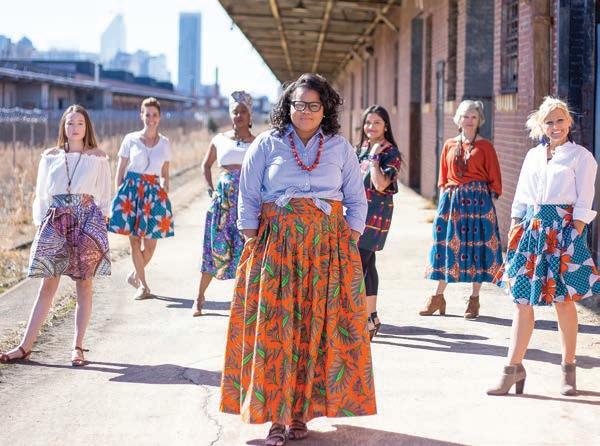
A couple of years ago, Boone emailed T.J. Trad, an Oklahoma-based cardiologist who established Cura for the World, a humanitarian organization that brings medical care and supplies to underdeveloped regions. She wondered if he might be interested in building a clinic in Burundi.
“He [had clinics] in Uganda, he was in the Congo, he was in some of the countries surrounding us.” After nearly a year with no reply, Trad responded.
“He said, ‘I’m sorry, it took me so long to get back to you, but sure, I’d love to build a clinic in Burundi.”
Last fall, Empower for Hope held its first fundraiser, emceed by local radio host Ramona Holloway. The organization raised $20,000, with Trad’s organization pledging additional funds. The money will be used to purchase land for the clinic and a new home for the sewing business in Burundi. Upgrading from the group’s former site, which was small and lacked access to clean water, would allow Amahoro’s products to achieve fair-trade certification and expand distribution to more retail stores.
On the day we first spoke, Boone shared disappointing news that an upcoming trip to Burundi had been canceled due to coronavirus travel restrictions. She had planned to look at a plot of land for the new clinic.
A couple of weeks later, she emailed to let me know her local workers had temporarily shifted their work to producing face masks that would be donated to health care workers and sold to the public.
“The best part about this is that we are utilizing scraps from our skirts, and the women are excited to help their community,” Boone says.
As Amahoro’s orders dried up amid the pandemic, Boone began collecting donations of $100 per month to support her African counterparts and their families while they are not working. Meanwhile, the organization decided to give up the small rented building where the sewers and artisans had worked for the last decade.
“When the smoke clears, we plan to build a new building and start again,” Boone says. “[The project has] grown, so now it’s not just 25 artisans. It’s 25 artisans, their families and all the people they support that are affected, which is about 200 people that depend on what we do.”
While the elegant skirts made in Charlotte provide a steady source of income for Empower for Hope, Boone hopes people understand the meaning behind the mission.
“It’s really about bringing women together from different backgrounds and learning to love and support each other,” Boone says.
“It gives us another outlet to tell the story about what we’re doing and why we’re working so hard at this — because women need to feel empowered and feel special and feel valued. And whether it’s here or whether it’s [in Burundi], that’s our mission to do that.” SP









